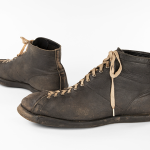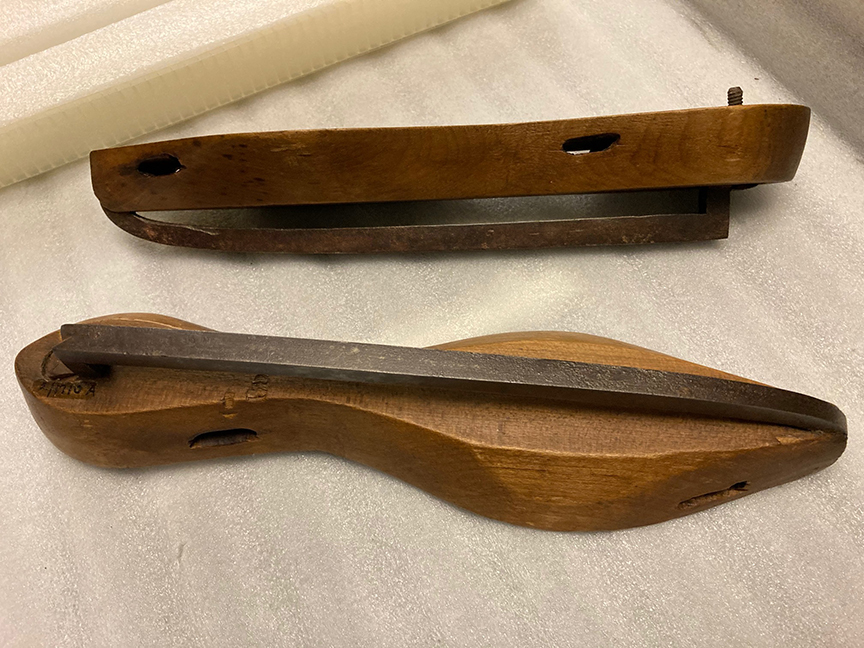John Wilson’s “The Syers Skate” blade, named after Madge Syers, the first women’s world champion, 1908. Maker of the boots is “The Lobby Shoes” company. Collection of the Bata Shoe Museum. Image © 2022 Bata Shoe Museum.
The skate research for Boots & Blades: The Story of Canadian Figure Skating took me down some fascinating ‘rabbit holes’ of interesting information and histories. In this blog, I will show the details we have found about three pair of skates. These are all from the 20th century.
The first pair here are tan leather boots fitted with blades that curl up in the front. These are constructed differently than the skates we use today. The toe has a ‘pick’, but the metal curl is set forward, so it does not connect with the mount plate of the blade. This would make it more unstable than the skates we have now. This type of toe curl and pick blade was developed in the 1870s, likely by A.G. Spalding & Bros. in the USA. The blades shown here were manufactured by John Wilson, the oldest known blade making company, at their factory in England in Portland Worms, Sheffield. The blades feature John Wilson’s trademark figure of a running greyhound dog on one side, and the model name “The Syers Skate” on the other.
Details of “The Syers Skate” blade. Collection of the Bata Shoe Museum. Image © 2022 Bata Shoe Museum.
Syers is the last name of Florence Madeleine Syers (née Cave) (1881 – 1917), best known as Madge Syers, who was a British figure skater. She is the namesake of this blade model. She is remarkable because she was the first woman to ever compete in figure skating. Before her involvement, women were simply not invited to compete as it was seen as a masculine aspect of the sport. She won the World championships in both 1906 and 1907, and then in 1908 when figure skating was part of the Summer Olympics in London, she won that honour as well. She was 27 years old; the oldest Olympic World figure skating gold medalist even today. Syers, unfortunately, had to retire from figure skating shortly after the 1908 Olympics because of her health. She died of Influenza in 1917, at the young age of 35. Madge Syers was certainly an inspiration to many women in sport at that time. The availability of “The Syers” blade is little known, but this model was most likely created during her peak of influence in the mid to late part of the decade, 1905 to 1910.
Related to “The Syers” skate blade is this pair in the Bata Shoe Museum collection made by A.G. Spalding & Bros. in the USA. Spalding innovated the upturned-toe blade with toe pick feature in the 1870s, which is seen in “The Syers” pair above. They likely produced this “Continental” model for several decades. To narrow down the date range for this pair of skates, we dug further into the name of the boot manufacturer.
Skate blades manufactured by A.G. Spalding & Bros. in the USA, fitted on boots made by the Northern Shoe Company, circa 1906 – 1918. Collection of the Bata Shoe Museum. Image © 2022 Bata Shoe Museum.
Details of the Spalding/Northern pair of skates showing the maker’s marks indicating “Duluth Hockey Shoe” model and the Northern Shoe Company. Collection of the Bata Shoe Museum. Image © 2022 Bata Shoe Museum.
This pair of skates has been dated circa 1906 to 1918 because of the information we found about the boot manufacturer. The boots are the ‘Duluth Hockey Shoe’ model, made by the Northern Shoe Co., in Minnesota. That boot was produced after the Phillip-Bell Shoe company became the Northern Shoe Company in 1906, and a subdivision called Duluth Hockey was created. By 1910, Northern Shoe’s four hundred workers produced 1,500 pairs of boots and shoes per day and sold over $1 million of footwear a year. It was a successful company with its own rail line and a dock for loading freighters. In 1918, the owner renamed the business A.J. Hartman Shoe Company.
The curl toe blade was produced in many countries over the period 1870 to 1930. This German-made pair is another example in the Bata Shoe Museum collection.
Skates manufactured by Germany’s Euchs brand showing the toe curl design that extends in front of the skaters boot. “Special” blade model. Collection of the Bata Shoe Museum. Image © 2022 Bata Shoe Museum.
Suzanne Petersen, Collections Manager








